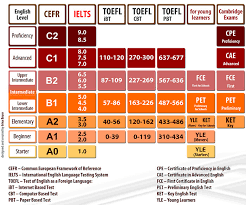Meaning Of Ielts Score, The International English Language Testing System (IELTS) is a widely recognized test used to assess English language proficiency for non-native speakers. It is often a requirement for academic, immigration, and professional purposes. Understanding the meaning of your IELTS score is crucial for setting realistic goals and making informed decisions about your future. In this article, we will delve into what your IELTS score represents and how to interpret it effectively.
What is IELTS?
IELTS is an English language test that measures four key skills: Listening, Reading, Writing, and Speaking. The test is divided into two versions: Academic and General Training. The Academic version is intended for those applying for higher education or professional registration, while the General Training version is aimed at those migrating to English-speaking countries or seeking work experience.
Understanding IELTS Score Bands
IELTS scores are reported on a scale from 1 to 9, with each band representing a specific level of English proficiency. Here’s a brief overview of what each band score signifies:
- Band 9: Expert User – Has a full operational command of the language with no mistakes.
- Band 8: Very Good User – Has fully operational command of the language with only occasional unsystematic inaccuracies.
- Band 7: Good User – Has operational command of the language, though with occasional inaccuracies and misunderstandings.
- Band 6: Competent User – Has generally effective command of the language despite some inaccuracies.
- Band 5: Modest User – Has partial command of the language and is able to cope with overall meaning in most situations.
- Band 4: Limited User – Basic competence is limited to familiar situations.
- Band 3: Extremely Limited User – Conveys and understands only general meaning in very familiar situations.
- Band 2: Intermittent User – Has great difficulty understanding spoken and written English.
- Band 1: Non-User – Essentially has no ability to use the language beyond a few isolated words.
How to Interpret Your IELTS Score
- Academic and General Training Requirements: Different institutions and organizations have varying score requirements. For example, many universities require a minimum score of 6.5 or 7 for admission to undergraduate or postgraduate programs. Similarly, immigration authorities might have specific score thresholds for visa applications.
- Overall Band Score vs. Individual Scores: Your IELTS result includes both an overall band score and individual scores for each of the four skills. Some institutions may have minimum requirements for each skill, so it’s important to consider your individual scores in addition to your overall band score.
- Score Validity: IELTS scores are typically valid for two years. If your score is older than this, you may need to retake the test to meet current requirements.
- Improving Your Score: If your score does not meet your target or the requirements of your desired institution or organization, consider focusing on areas where you scored lower. Practice and preparation can help you improve your language skills and achieve a higher score in future attempts.
Conclusion
Understanding the meaning of your IELTS score is essential for achieving your academic, professional, or immigration goals. By familiarizing yourself with the band scores and their implications, you can better assess your English proficiency and take appropriate actions to meet your objectives. Whether you are aiming for higher education, employment opportunities, or migration, a clear grasp of your IELTS score will help you navigate the next steps in your journey.
If you need further assistance or resources for preparing for the IELTS test, don’t hesitate to seek guidance from language experts or educational counselors. Good luck!



